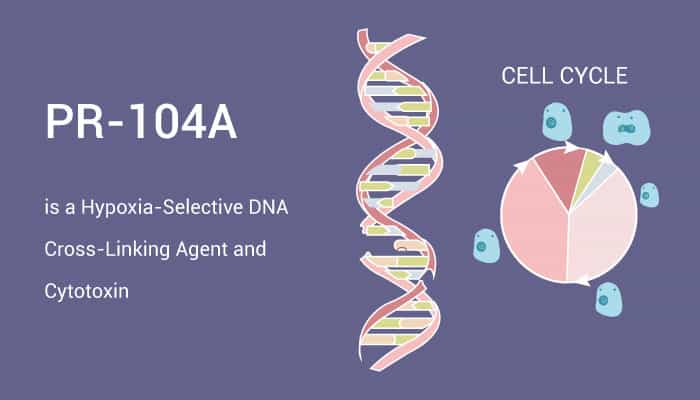PR-104, like TH-302, is a prodrug of nitrogen mustard that has shown some degree of efficacy in adult patients with relapsed/refractory acute myeloid leukemia (AML).
PR-104A (SN 27858) is the alcohol metabolite of phosphate prodrug PR-104. PR-104A is a hypoxia-selective DNA cross-linking agent/DNA-damaging agent and cytotoxin. Therefore, this compound possesses antitumor Activity.

In detail, PR-104A is metabolized under hypoxia by the 1-electron NADPH:cytochrome P450 oxidoreductase. Thus, PR-104A also can be used for the research of relapsed/refractory T-lineage acute lymphoblastic #leukemia (T-ALL).
Firstly, in vitro, PR-104A (1-100 uM) shows antiproliferative potency in a panel of 10 human carcinoma cell lines following 4 hours exposures under aerobic and hypoxic conditions with the lowest IC50 (0.51 μM) in H460 non–small cell lung cancer cells and highest (7.3 μM) in PC3 prostate cells.
Moreover, in vivo, the phosphate ester “pre-prodrug” PR-104 converts rapidly to the corresponding prodrug PR-104A. Also, H460 xenografts show significant sensitivity to PR-104 (total dose 3.2 mmol/kg). The single-agent activity against H460 tumors refractory to docetaxel, cisplatin, gemcitabine, and cyclophosphamide was particularly striking. Compared a daily (qd ×14) versus weekly (qw ×3) schedule against the chemoresistant H460 xenograft model using the same total dose (3.2 mmol/kg) over 14 days, which exhibits lower toxicity both schedules.
In conclusion, PR-104 represents a potential novel treatment for relapsed/refractory T-ALL. AKR1C3 expression could serve as a biomarker to select patients who may respond to PR-104 in prospective clinical trials.
Reference: